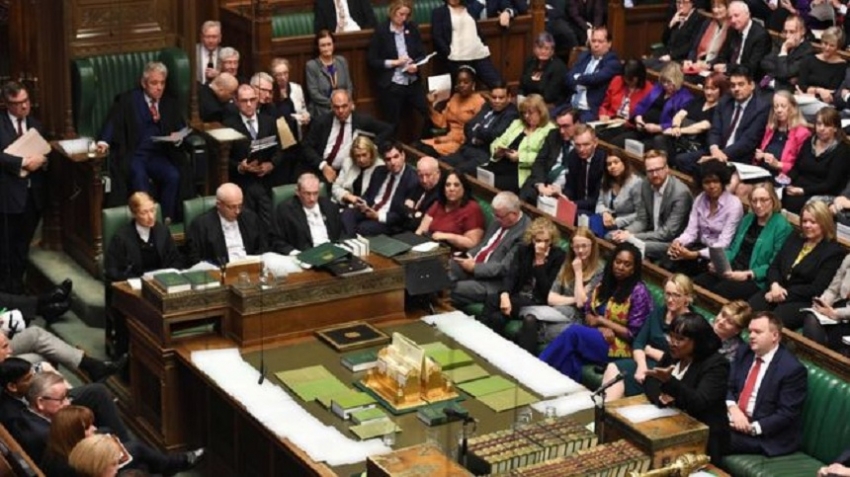MPs will be called to Parliament for a special Saturday sitting in a decisive day for the future of Brexit.Parliament will meet on 19 October after a crunch EU summit - seen as the last chance for the UK and EU to agree a deal ahead of 31 October deadline.If a deal is agreed, Boris Johnson will ask MPs to approve it - but if not, a range of options could be presented. The BBC's Laura Kuenssberg says these could include leaving without a deal, and halting Brexit altogether.MPs will have to agree a business motion in the Commons for the sitting to take place.If agreed, the additional day would coincide with an anti-Brexit march run by the People's Vote campaign, which could see thousands of protesters heading to Westminster.
The prime minister has said he is determined that the UK will leave the EU on 31 October, despite legislation, known as the Benn Act, which requires him to write to the EU requesting a further delay if a deal is not signed off by Parliament by 19 October - or unless MPs agree to a no-deal Brexit.Scottish judges said on Wednesday they would not rule on a legal challenge from campaigners seeking to force the PM to send the letter - or to allow an official to send it on his behalf if he refused. They said they would delay the decision until the political debate had "played out".No 10 has insisted Mr Johnson will comply with the law, but Laura Kuenssberg says there are still conversations going on in Downing Street about writing a second letter, making the case that a delay is
unnecessary.The House of Commons has only sat on four Saturdays since 1939, including on 2 September that year, due to the outbreak of World War Two.The last time there was a Saturday sitting was 3 April 1982, due to the invasion of the Falkland Islands.
Talks are ongoing between the UK and EU after Mr Johnson submitted new proposals for a Brexit deal, centred on replacing the Irish backstop - the policy negotiated between Theresa May and the EU to prevent a hard border returning to the island of Ireland.The UK's chief negotiator, David Frost, will meet European Commission officials later - but sources on both sides told BBC Brussels reporter Adam Fleming that technical talks had effectively reached the limit of what they could achieve.Brexit Secretary Steve Barclay and the EU's chief negotiator, Michel Barnier will have a lunch meeting on Thursday to discuss the state of play.French President Emanuel Macron has told Mr Johnson the EU will make its final position clear on the chances of a deal by the end of this week.
'Blame game' row As the clock ticks down towards the summit, the political tension has been rising.A row broke out on Tuesday after a No 10 source said a call between Mr Johnson and the German chancellor, Angela Merkel, had made a deal "essentially impossible", claiming she made clear a deal based on his proposals was "overwhelmingly unlikely".Mrs Merkel's office said it would not comment on "private" conversations.But the President of the European Council Donald Tusk sent a public tweet to Mr Johnson, accusing him of playing a "stupid blame game" - a criticism echoed by a number of opposition parties in the UK.
On Tuesday night, Irish Taoiseach (Prime Minister) Leo Varadkar spoke to Mr Johnson on the phone for 45 minutes, and told broadcaster RTE afterwards it would be "very difficult" to reach an agreement before the end of the month.However, the two leaders are expected to meet for further talks later this week.This special sitting will be a huge day.That is because it will be the moment when Boris Johnson either returns to chants of "hail the conquering hero" - if he manages to get this elusive Brexit deal - or, more likely, returns with no-deal and has to set out his next steps.And we are hearing that No 10 may seek to seize the initiative by putting down a series of motions for MPs to vote on - in other words asking them do they want to leave with no deal, do they want to revoke Article 50, etc.But at the same time that Boris Johnson wants to use that moment to try and grasp the initiative, it is clear the rebel alliance of opposition MPs also wants to seize the day.They want to ensure Boris Johnson sits down, gets out the Basildon Bond and writes that letter to the European Commission asking for a further delay.So both sides are now poised to try and gain control of that Saturday to map out the next steps, assuming - and I think it is a fairly widespread assumption in Westminster now - that there is not going to be a deal.
Can a no-deal Brexit still happen?
By Daniel Kraemer
Boris Johnson is at odds with Parliament on the issue of leaving the EU without a deal
Boris Johnson has repeatedly said the UK is leaving the EU on 31 October. However, should the PM fail to strike a Brexit deal by 19 October, a law passed by MPs says the PM must extend the deadline.So what exactly is this law and how might the government try to get round it?
In September MPs passed a new law - introduced by Labour's Hilary Benn - designed to stop Mr Johnson pushing through a no-deal Brexit on 31 October.Under the "Benn Act", Mr Johnson would be required to request a three-month Brexit delay unless he can pass a deal or get MPs to approve a no-deal exit by 19 October.However, despite the new law, International Trade Secretary Liz Truss insists Brexit will still happen at the end of the month:"We'll leave without a deal. That's clear - deal or no deal, we're leaving on the 31st", she told the BBC.So what possible options might the government be looking at?
Labour MP Hilary Benn's bill sets the length of any further extension to three months
Two lettersThe law would force the prime minister to request the extension via a letter - it even sets out the exact wording.
One idea that has been floated is for Mr Johnson to follow the rules but write a second letter, telling EU countries that he actually does not want an extension.This could lead EU countries to decide not to grant the extension as it would be clear it is not what the UK government actually wants.In this scenario it is possible the EU could simply ignore the second letter and just grant the extension.
Persuade someone to reject
Any extension to the Brexit deadline would have to be agreed to by all EU member states. So, theoretically, Mr Johnson could comply with the law by writing the letter, but persuade just one country to veto it.oris Johnson would be required to send a letter to Donald TuskBut persuading a country to side with the departing UK over their European neighbours could be a long shot.
MPs vote for no deal or reject an EU extensionThe prime minister would avoid having to send any letter if MPs vote in favour of a no-deal Brexit by 19 October. This is almost impossible as there is no majority in Parliament for this.In another scenario, the EU grants an extension but proposes a date other than 31 January 2020. If that happens, MPs would have the power to reject the proposal, therefore leaving us heading towards a no-deal exit.An election is on the cards but the prime minister would still have the power to choose the date
Ignore the law and wait for the courtsThe most simple option for the prime minister is to sit on his hands and refuse to write a letter. This would almost certainly lead to legal action and constitutional experts have suggested he would face almost certain defeat.Mr Johnson could bank on the legal process taking over 12 days to complete, which would take him past the Brexit deadline before being forced to ask for an extension,
Refuse to resignOne option open to MPs who oppose a no-deal Brexit is to defeat the government in a vote of no confidence. In this scenario, an alternative government could emerge and take over from Mr Johnson if it can prove it has the confidence of a majority of MPs.By convention, Mr Johnson would visit the Queen to resign and recommend the appointment of whoever the leader of the alternative government is.In theory, he could refuse to leave and become a squatter behind the black door of No 10. This could put the Queen in an unprecedented position as she may be forced to sack him.
Brexit: The end for negotiations in Brussels?
Katya Adler
Europe editor
@BBCkatyaadleron Twitter
9 October 2019
Share this with Facebook Share this with Messenger Share this with Twitter Share this with Email Share
Related TopicsBrexit
Image copyrightAFP/GETTY
Image caption
Donald Tusk lost his cool with Boris Johnson on Twitter
The EU has tried very, very hard throughout this Brexit process to present a cool, calm, united front while political volatility reigns in the UK.
"They want to come across as the adults in the room," one Spanish journalist put it to me.
But sometimes the EU's distant, business-like veneer noticeably cracks.
There are a few memorable examples: President Macron describing Brexiteers who promised the UK a better life outside the EU as liars; Luxembourg's prime minister recently pouring out in public the frustrations with the Brexit process felt privately by many in the EU; and now, on Tuesday, the president of the European Council, Donald Tusk, responding angrily to Downing Street finger-pointing about the state of Brexit renegotiations by addressing this tweet directly to the prime minister.
Mr Tusk's flash of emotion did not go down well in European government circles at this sensitive juncture, as the EU leaders summit and the 31 October Brexit deadline fast approach.
The EU wants a deal and, if negotiations fail, it wants voters across the EU to believe that Brussels did its best - staying focussed on the facts at the negotiating table, rather than getting involved in cross-Channel mud-slinging.
And bang on cue, not long after Mr Tusk's blame game outburst, the EU's chief Brexit negotiator tweeted that "efforts continue to find an agreement with the UK".
Is no-deal about to become the PM's policy?
What will happen with Brexit in the next four weeks?
But no-one I speak to in the EU is holding his or her breath.
"We have no idea where the UK government wants to go in the next 20 days," (ie before the 31 October Brexit deadline) a diplomat from northern Europe told me.
He said the EU was still unclear how high getting a Brexit deal featured right now on the prime minister's list of priorities - compared, for example, with winning a general election.
Image copyrightREUTERS
Image caption
The EU is unclear on what the prime minister's priorities are
So is the search for a deal now over in EU eyes?
Not really. The EU says it's still open for talks. It hasn't entirely ruled out the possibility of a deal by the end of this month.
Realistically though the prime minister's proposals on how to replace the Irish backstop in a Brexit deal are hugely problematic for Brussels.
How does the border plan differ from the backstop?
Brexitcast: Blame Academy
While diplomats praise some aspects of Boris Johnson's offer, his insistence that Northern Ireland remains in the UK's customs territory after Brexit leaves the EU with unpalatable choices:
Either a) having customs infrastructure on the island of Ireland, which Dublin says is a no no.
or b) the EU not controlling its customs border which Brussels says would both lead to smuggling and contravene WTO regulations.
One high-level EU diplomat joked: "If that customs border between the Republic of Ireland and Northern Ireland were left open, as the UK pretty much asks, then I would quit my job and start a smuggling enterprise. Far more lucrative."
Media captionConfused by Brexit jargon? Reality Check unpacks the basics.
But the EU isn't laughing. Or playing politics, insists Brussels. It says its objections to Boris Johnson's customs proposals are practical, not political.
EU technocrats maintain that leaving a post-Brexit customs border open on the island of Ireland would compromise food safety and the safety of children's toys, for example.
They warn that any accident or contamination would affect the whole single market plus the EU's reputation amongst other trading partners.
"We won't do that," said a diplomat from a country traditionally close to the UK. "We can't risk that."
What is in Boris Johnson's Brexit plan?
Divisions continue over opposition Brexit strategy
And if the EU did take that risk, then diplomats warn that Dublin would pay the price. Goods entering the single market via Ireland would be regarded with suspicion, they say, and the free movement of goods in the single market would be seriously compromised.
EU sources insist that whatever the Johnson government threatens or however it cajoles, the EU "can't be bullied" into accepting the prime minister's proposals as they stand.
"It would be easier if this discussion were about money," a European civil servant told me. "Then both sides could haggle and reach agreement but there's no compromising over food safety."
Media captionWhat could Brexit mean for sausage rolls?
EU diplomats say they accept the principle of two customs systems (EU and UK) on the island of Ireland but that it has to work.
EU leaders still look to the UK to be more flexible in its demands. Though they hear Boris Johnson when he says Northern Ireland must remain in the UK's customs union to preserve UK unity.
As always when it comes to the backstop, Ireland has a big role to play here too.
What could no deal mean for the Irish border?
10 ways no-deal Brexit could affect you
Since the EU won't compromise the single market, EU diplomats say Brussels will take its cue from Dublin as to how many checks/controls it could stomach on the island of Ireland.
The EU attitude here is: "What's ok for Dublin, works for the rest of us".
But the Johnson government has expressed frustration with the Irish government. Their belief is that Dublin is "holding out" on making compromises since they believe a new Brexit extension is around the corner.
And that is exactly what the EU thinks.
Though no-one I speak to is starry-eyed about the possibility of having more time to talk.
Whether next week or next month, a deal still needs to be found that's acceptable to both sides - and not just to negotiators but to the European and the UK parliaments.
And no-one is sure what that would look like. Which is why the feeling in Brussels is that the chances of no deal have gone up again. Extension or no extension.



















